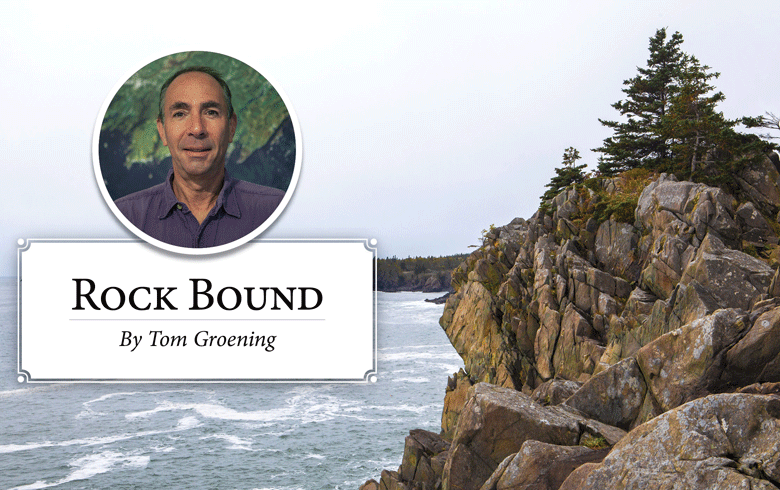As I write this in early August, it’s a couple of days away from the 40th anniversary of our moving to Maine. I’m not expecting the governor to make the day a state holiday or that friends and neighbors fete us with food and drink, but I believe this 40-year love affair is worth reflection.
I grew up in New York, and my prior experience in Maine was confined to three visits. As an eight-year-old, I traveled with my parents through the state to Quebec. My father shot home movies of a log drive on the Kennebec, a practice that would end in ten years. The other two visits were to my now-wife’s family camp on a lake east of Lincoln while I was 21 and 22.
When I was hired as a teacher at a boarding school near Augusta, we figured on staying for five years then trying to buy land in rural Massachusetts. But having to stay on campus every other weekend meant on the off weekends we’d hit the road—Popham Beach, Portland, Rockport, MDI, Deer Isle, Rangeley, Moosehead Lake.
I have embraced far more libertarian values in these 40 years.
It was a courtship that led us, just a year later, to want to buy land on the coast, which we did, in Belfast, in 1984.
I later learned we were part of a second wave of migrants, coming a decade after the back-to-the-landers. We had no illusions of living self-sufficiently as many of them did, but the opportunity to build our own house, cut firewood to heat it, and live closer to the land than we did in surburbia was appealing.
The back-to-the-landers had changed the landscape, making previously insular communities less so. And when they left the woods for towns, they added food coops, boutiques, fine dining, and more art galleries, which we also found appealing.
What did we and our cohorts in this second wave bring? Well, some brought significant capital (we sure didn’t). Most of us brought education and skills. The rap on we newcomers has been that we try to usher in amenities we miss from our homes, but I think we also brought lessons about failing to protect from poorly planned commercial and residential development.
What has Maine done for and to me? Our former columnist Colin Woodard’s American Nations comes to mind. In it, he argues—persuasively—that the U.S. is made up of 11 distinct regions, each with deeply embedded social and political values that hold sway. As Woodward defines them, Maine is “Yankeedom.”
I have embraced far more libertarian, “live and let live” values in these 40 years, developed a healthy cynicism about policy that is removed from practical application, and have come to respect the validity of that catch-all phrase “common sense,” all of which are found in “Yankeedom.”
Back in the late 1980s while covering a Belfast City Council meeting on a summer night and hearing a consultant describe what seemed to me a lovely addition to the downtown streets, I was brought up short when a councilor observed that this amenity wouldn’t stand up well to the business end of a snowplow. That’s common sense.
Maine—existing at “human scale,” as someone I recently met put it—has allowed me to see impact in my work. Yes, some transplants might be said to come for the chance to be big fish in a small pond. But that is a cynicism I have not embraced. The impact in work may be short-lived, but it’s real.
And Maine has given our children—now adults with their own families in Maine—a stellar environment in which to grow and spread their wings.
In our early years, I was awed at Maine’s beauty—Camden’s High Street in autumn, a wind-whipped early spring day climbing Blue Hill, a hot summer morning at Roque Bluffs, the glowing dusk of a December day in Stonington.
Soon, I realized that what I loved most was the power of community it provides. I walk down Main Street in Belfast and say hello to someone, and if I stop to think how we first met and come up empty, well… that’s community.
Tom Groening is editor of The Working Waterfront and Island Journal. He may be reached at tgroening@islandinstitute.org.





